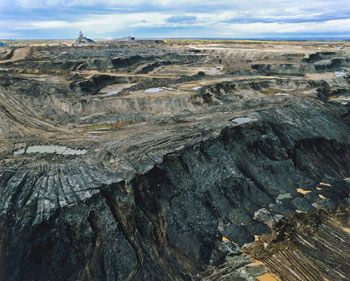In a rare move, more than 100 prominent scientists from across North America released a consensus statement on tar sands development in Canada.
"The science is clear," they say, "there can be no more oil sands development if we are to solve the global climate crisis."
Their statement, "Ten Reasons for a Moratorium" begins this way:
"No new oil sands or related infrastructure projects should proceed unless consistent with an implemented plan to rapidly reduce carbon pollution, safeguard biodiversity, protect human health, and respect treaty rights."
"If Canada wants to participate constructively in the global effort to stop climate change, we should first stop expanding the oil sands. More growth simply shows Canada has gone rogue," says Thomas Homer-Dixon, professor of governance innovation at the Balsillie School of International Affairs, University of Waterloo.
And "oil sands development is industrializing and degrading some of the wildest regions of the planet, contaminating its rivers, and transforming a landscape that stores huge amounts of carbon into one that releases it," says Tom Sisk, an ecologist at Northern Arizona University.
It is time for science to have a central role in the debate on whether tar sands expands in North America.
Imagine, tar sands companies claim they can restore this to its original state:

10 Reasons for a Moratorium "each grounded in science":
1. Incompatible with climate protection: incompatible with limiting warming to a level that society can handle without widespread harm.
2. Slowing the shift to clean energy.
3. Inadequate monitoring and enforcement: pollution is barely monitored or enforced.
4. Contamination of the landscape: contaminants from tar sands permeate the land, water and air of Canada’s Boreal Forest.
5. Insufficient reclamation: the industry’s claim that mine sites can be restored to their former natural state is not true. The few attempts to reclaim mined lands have produced landscapes that bear little resemblance to what was there previously and contain only a fraction of the historical biological diversity.
6. First Nations treaty violations: development and transport of tar sands violates the title and rights of many Aboriginal peoples of North America.
7. International implications: other countries will decide whether or how to develop their own large unconventional oil deposits based on this lack of leadership.
8. Economically affordable alternatives: Controlling carbon pollution will not derail the economy, it will grow it.
9. Cumulative impacts ignored: Responsible policies should address the interwoven, system-wide impacts of oil sands development: mines, refineries, pipelines, rail and tanker traffic, and the global climate system.
10. Canadians demand solutions: the majority of North Americans want their leaders to address climate change.
Read our article, Tar Sands Become Question Mark in Canada, While US Quietly Expands.
Visit the website they launched for this purpose:
